Market Dominance Guys
Guest: Donny Crawford
Episodes
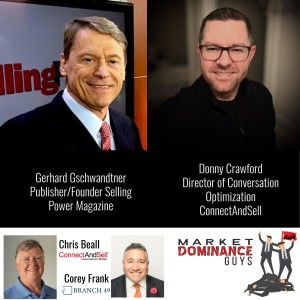
Tuesday Apr 05, 2022
EP126: Pattern Interrupts Are Your Friend
Tuesday Apr 05, 2022
Tuesday Apr 05, 2022
What’s a pattern interrupt? And how can it help you break down the resistance most people feel when ambushed by a cold call? Donny Crawford, Director of Conversation Optimization at ConnectAndSell, joins our Market Dominance Guy, ConnectAndSell CEO Chris Beall, on a Selling Power webinar hosted by Founder Gerhard Gschwandtner. These three conversation experts share some little-known tricks of the cold-calling trade, one of which is that saying something unexpected, like “Can I have 27 seconds to tell you why I called?”, can break a prospect’s usual pattern of hanging up or refusing to engage. As Donny says, it truly is a game-changer, especially when said in a friendly, playful voice. “The friendliness actually matters,” he explains. “You’ve got to be assertive enough, but in a friendly manner.” Get ready to absorb this and other helpful tips from ConnectAndSell’s Flight School cold-calling training lessons in this Market Dominance Guys’ episode, “Pattern Interrupts Are Your Friend.”
About Our Guest
Donny Crawford is Director of Conversation Optimization at ConnectAndSell. With the expertise developed as a former customer and as Customer Success Manager at ConnectAndSell, he operates as chief instructor of Flight School, a structured program designed to help cold callers find their voice. Hear more from Donny Crawford on his other Market Dominance Guys’ episodes.
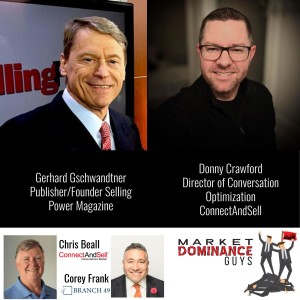
Wednesday Mar 23, 2022
EP125: Find Your Cold-Calling Voice
Wednesday Mar 23, 2022
Wednesday Mar 23, 2022
When you’re making a cold call, is the voice you’re using an effective voice? Or could it use a little fine-tuning so that you can engender trust with your prospect — the trust needed to secure a discovery meeting? Donny Crawford, Director of Conversation Optimization at ConnectAndSell, joins our Market Dominance Guy, ConnectAndSell CEO Chris Beall, to walk you through how to find your most effective cold-calling voice. In previous episodes of this podcast, you may have heard our guys talk about ConnectAndSell’s Flight School cold-call training program. In today’s episode, you’ll get a mini–Flight School lesson all your own, presented by master instructors, Donny and Chris. Not only will you get a tried-and-true script, but more importantly, you’ll hear detailed instructions on how to use your tone of voice to achieve cold-calling success. As Donny says, you’ll learn to bring out your “friendly voice,” and when you do, you’ll see how that voice can make some magic happen. All this — and so much more — in today’s Market Dominance Guys’ episode, “Finding Your Cold-Calling Voice.”
About Our Guest
Donny Crawford is Director of Conversation Optimization at ConnectAndSell. With the expertise developed as a former customer and as Customer Success Manager at ConnectAndSell, he operates as chief instructor of Flight School, a structured program designed to help cold callers find their voice. Learn more from Donny Crawford on these Market Dominance Guys’ episodes:
“Three Reasons Sales Reps Don’t Follow Up” https://marketdominanceguys.com/e/three-reasons-sales-reps-dont-follow-up/
“The Power of the Anti-Curse to Overcome Rejection” https://marketdominanceguys.com/e/the-power-of-the-anti-curse-to-overcome-rejection/
“Your Sales People Are Brain Surgeons” https://marketdominanceguys.com/e/your-sales-people-are-brain-surgeons/
“Never, Never, NEVER Retire a Follow-Up Call” https://marketdominanceguys.com/e/never-never-never-retire-a-follow-up-call/
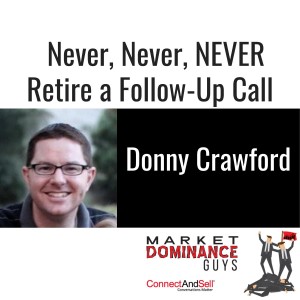
Wednesday Dec 23, 2020
EP62: Never, Never, NEVER Retire a Follow-Up Call
Wednesday Dec 23, 2020
Wednesday Dec 23, 2020
In this follow-up to last week’s Market Dominance Guys’ podcast, “Your Sales People Are Brain Surgeons,” Chris and Corey have another conversation with ConnectAndSell’s customer success manager, Donny Crawford, about using the telephone plus your beliefs to gain market dominance.
First things first, they discuss how to get prospects on the phone who are the most likely to set a meeting with you. It sounds like a numbers game — more dialing equals more people picking up the phone, which equals more meetings set, right? But as every sales rep knows, you can lead a prospect to a conversation, but you can’t make them link you to their calendar. That rate of success is fairly low. In his experience calling on prospects, though, Donny discovered an amazing way to increase the dial-to-meeting conversion rate: make more calls to people on your follow-up list. He found out that if at first you don’t succeed, call, call, call again. Wait till you hear what his success rate is — and then listen to the story Chris tells about follow-up calls, which corroborates Donny’s experience.
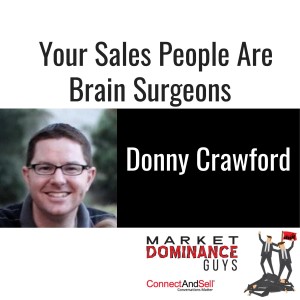
Wednesday Dec 16, 2020
EP61: Your Sales People Are Brain Surgeons
Wednesday Dec 16, 2020
Wednesday Dec 16, 2020
What do you do if you have a group of 25 or so folks on your sales team, and you want to really make a splash in the first quarter of the new year? Due to the on-going pandemic, we all know that connecting with customers face to face at trade shows is no longer an option. No doubt, your reps are still working from home, most of them researching their prospects and trying a little social media marketing, but all of them eventually doing the traditional dialing, dialing, dialing, and praying, praying, praying that someone will pick up the phone. How, in the name of all that’s financially holy, are your reps going to help your company dominate its market if they simply continue to use the same old methods during this brave new year we are entering?
Our two Market Dominance Guys, Chris and Corey, along with this week’s guest, ConnectAndSell Customer Success Manager Donny Crawford, diagnose the problem of what’s keeping companies from the market domination they desire. These three cold-calling practitioners offer their insights into what works best to get the greatest number of conversations with decision makers — despite cold call outcomes like “Not me,” “Not now,” “Not interested,” “Call back later,” or even the dreaded hang-up. Wait till you hear Donny’s proven method for how to turn repeated hang-ups from a prospect into the appointment you’re after.
Chris compares the work of a salesperson to that of a brain surgeon, first cracking open a company’s “skull” by getting that first appointment, and then exploring what’s wrong inside the “brains” of a company by having a discovery conversation. Join Chris, Corey, and Donny as they guide you through that operation during this episode of Market Dominance guys, "Your Sales People are Brain Surgeons."

Tuesday May 19, 2020
EP31: The Power of the Anti-curse to Overcome Rejection
Tuesday May 19, 2020
Tuesday May 19, 2020
This is the continuation of the conversation with Donny Crawford about sales follow up, overcoming rejection, and likening sales to Google search results. Thank people for the conversation no matter how it went. This helps keep your emotions in check and allows you to move forward to the next call, even if you were rejected in the previous one. Get some very applicable and practical techniques in this episode of Market Dominance Guys - The Power of the Anti Curse to Overcome Rejection.
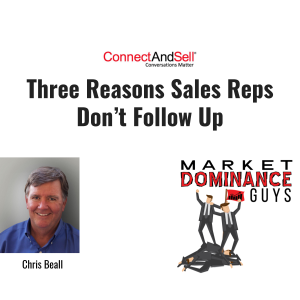
Tuesday Apr 07, 2020
EP25: Three Reasons Sales Reps Don‘t Follow Up
Tuesday Apr 07, 2020
Tuesday Apr 07, 2020
In this episode of the Market Dominance Guys, Chris Beall talks with ConnectAndSell's Customer Success Manager, Donny Crawford drilling it down to the three reasons Sales Teams don't follow up. When we hire people to sell for us, whether it's to sell meetings or whether it's to sell deals, we tend to put them under a compensation regime that emphasizes this quarter. Need happens at this moment to match up with what you can provide. And in order to determine their need, you have to have a discovery conversation with them. And until you have a discovery conversation, you don't actually know whether they need your offering at all much.
As we know that mounts the pressure to meet numbers of calls but doesn't usually accomplish closing more deals. Learn how yes, no, not now affects our emotion tied to rejection and perception of rejection - the ability to keep our emotions in check. This is part one of a two-part session.